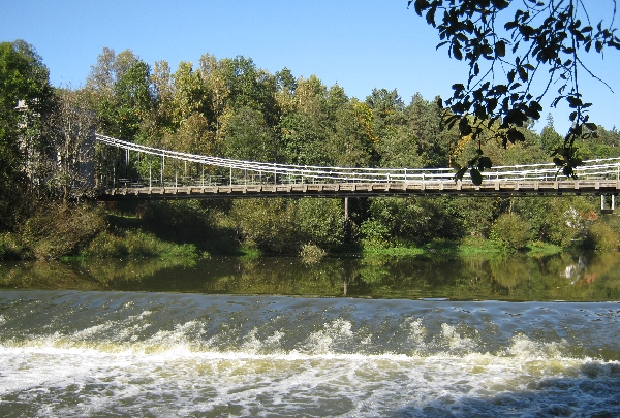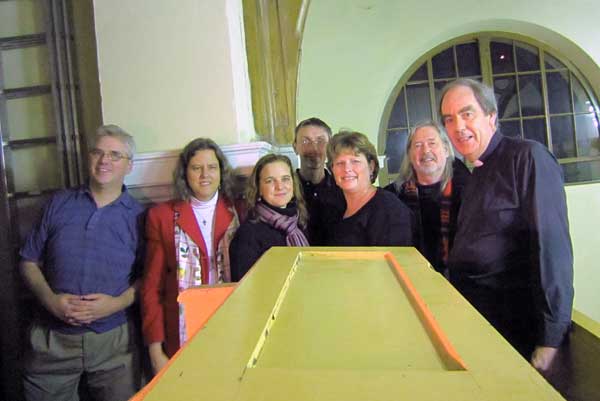
When I was Rector of the Shelswell Group of Parishes in North Oxfordshire, quite frequently on Sundays, I would officiate at three services during the day – and occasionally at four. Certainly on Easter Day, I would always celebrate the Eucharist three times during the morning, in three different Churches, at 08.00, 09.15 and 10.45.
One of the joys of being the Anglican Chaplain in Prague, is normally only having one service to take each Sunday. And because our Ceskobratrské Církve Evangelické host congregation meets for worship at 09.30 each Sunday, our Sung Eucharist cannot begin until 11.00.
However, having held the first ever English-language service of Lessons and Carols in Brno last December, since the New Year, I am now travelling there to officiate at 18.00 in the evening on the second Sunday of each month. My aim is to establish a satellite congregation in Brno, thus providing a second place of English-speaking Anglican worship in the Czech Republic.
On most Sundays, our Czech hosts in Prague, finish their service at about 10.30 which gives us a full thirty minutes to set up to begin our worship at 11.00. Being partly Presbyterian, they do not have Communion that often. But when they do have Communion, their service is nearly always fifteen minutes longer. And on Easter Day they do, of course, have Communion. Thus last Sunday, we had to wait outside until nearly 10.45, until we could gain access to the Church building.
This was my fourth Easter in Prague so I knew to expect many visitors in the congregation. And whilst a small number of the regular congregation are away from Prague at Easter, we lose far fewer than we do at Christmas or during July and August. However Easter Day 2012, not only saw a very good turnout of the regular congregation including several ‘lost sheep’ who we hadn’t seen for some time, but also a very large number of visitors. According to Honza, who went up to the balcony and counted, we were 90 adults and 22 children. The congregation was therefore bigger than any in the whole of 2011.
As on most Sundays, there were double figure nationalities present. We had a large number of American visitors and a smaller numbers of Brits. But we also had two visitors from Denmark, another from Malta and a young Ghanaian couple who told me they had travelled in from Hradec Kralové, 120 km outside Prague, in order to attend Easter Day worship.
We celebrated Christ’s triumph over sin and death in liturgy and song, making an extremely ‘joyful noise’ as our worship culminated in singing ‘Thine be the glory’ to the wonderful Handel tune ‘Maccabaeus’. As in previous years, this was the second time on Easter morning that the Church walls had resounded to the tune as our host congregation ended their worship with the self-same hymn sung in Czech.
After the service, as I and Gordon the Church Treasurer, together with David, another member of the Church Council, exited the vestry and locked up the Church, we once more experienced the peculiarities of the weather of recent months when we were greeted by a snow shower. So none of the three of us could resist starting to sing, “I’m dreaming of a white Easter” as we made our way across the road for Coffee Hour.
Then for me, it was back to my Oxfordshire days as I set off for my second service of Easter Day. But instead of hopping in the car for a ten minute drive to the next village, it was a three-stop journey on the tram, followed by a two hours and forty minute journey on the 14.42 Prague-Brno train, followed by a short walk to the little Czechoslovak Hussite Church which we are currently using for worship in Brno.
There was a great contrast to our worship in Prague in the morning. But as twelve of us gathered to celebrate the Eucharist on Easter Sunday evening, the worship was just as meaningful. Only one person present was a visitor, a British lady who comes to Brno at least three times a year to visit a close relative. The rest were English-speakers currently resident in Brno who I trust and pray will help form a new worshipping community in the second city of the Czech Republic.
Whilst it is feasible to return to Prague on the last train of the evening, as on my previous visit, I decided to stay overnight and travel back the next day. It makes the trip less tiring and gives more opportunity to talk with people after the service. And in this amazing small world, through the publicity put out by the Brno Expat Centre about our monthly services, I’ve reconnected with a young lady called Lynsey who I first met fourteen years ago with her parents on a French camp-site. Lynsey and her partner Johnny have recently moved to Brno to work for Monster, an online recruitment agency who have established their main European base in Brno. So I had the privilege of being the first guest to sleep on their newly purchased sofa bed on Easter Sunday night.






